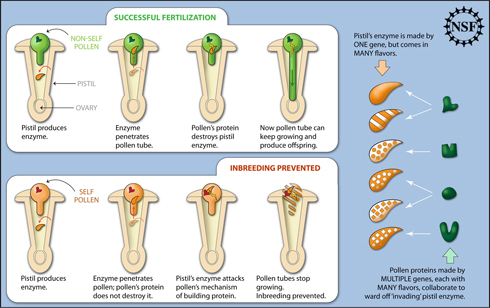The Genetics of Self-Incompatibility
*Petunias show that the mechanisms behind inbreeding prevention are similar to immune response*
About the image: The female part of the petunia flower secretes an enzyme that is designed to deter pollen tube growth, thereby preventing fertilization. However, in the cases that the pollen has come from a genetically different plant, the pollen produces its own protein that combats the pistil’s enzyme. With the enzyme out of the way, the pollen tube can keep growing and fertilization can occur. Image credit: Zina Deretsky, National Science Foundation
Inbreeding is a bad strategy for any organism, producing weak and problematic offspring. So imagine the challenge of inbreeding prevention in a plant where male and female sexual organs grow right next to each other! Such is the genetic conundrum faced by the petunia. (more…)

